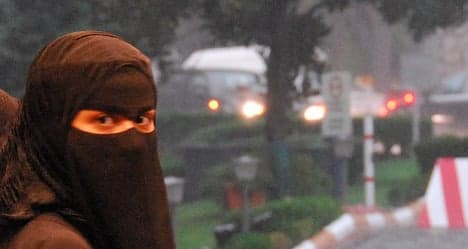'Equality matters more than religious freedom'

Spain's Supreme Court recently overturned a ban on burqas in the Catalonian town of Lleida (Lérida), saying the prohibition contravened European human rights treaties. In Opinion this week, we listen to two key players.
The case for the burqa ban: Angel Ros, Lleida's mayor who successfully banned the burqa in 2010
"I'm proud that Lleida is the first city in Spain to fight against something that is discriminatory against women," told Spanish daily El Mundo.
Back in 2010, Ros admitted that the ban restricted the choice of Muslim women. But he also argued it was a way of "teaching each of these women, and society in general, that there are efforts being made to guarantee equality, solidarity and freedom.
"We had to act before it became a serious issue," said Lleida's top city official.
"We have to help with women's integration and work closely with them, as they are the most likely victims of discrimination."
Lleida's mayor called into question suggestions that the veil is something women "willingly choose to wear". He said that although Islam was a tolerant religion, it had "dogmatic views that lead to symbols of inequality".
After Lleida's burqa prohibition was revoked by the Supreme Court, mayor Ros told El Mundo: "For me, equality between men and women and a woman's dignity are more important than religious freedom."
The case against the burqa ban: Carlos Antolí Mendez, a lawyer who represented the Watani Association's bid for the ban to be lifted
"Spanish law already requires people to identify themselves when entering any public building, so banning the burqa or any religious head gear altogether was completely unnecessary in the first place," he told The Local.
"This was just a political strategy by Mr Ros. He used it as a means of gaining votes before upcoming elections in 2010. Whether that shows that racism or religious discrimination is common in Catalonia is another story. There haven't been any incidents to suggest so.
"Most Muslims women in Catalonia are Moroccan and not usually as religiously devout.
"There has been an increase in the number of imams promoting a stricter version of Islam in Catalonia though, as has been the case in Holland, France and Belgium. But what really matters is that there are only 15 to 20 women out of 120,000 people living in Lleida who wear the burqa.
"What the ban did to these women is sentence them to life under house arrest. Being seen in the street without their religious attire was too shameful. And saying that they're forced to wear the burqa or the niqab is far from true.
"So when the Watani Association (a Muslim association in Lleida) approached me I agreed to take up the case because it seemed like a total breach of religious freedom. It seemed like the ban would just open the door to more forms of discrimination against other groups."
Comments
See Also
The case for the burqa ban: Angel Ros, Lleida's mayor who successfully banned the burqa in 2010
"I'm proud that Lleida is the first city in Spain to fight against something that is discriminatory against women," told Spanish daily El Mundo.
Back in 2010, Ros admitted that the ban restricted the choice of Muslim women. But he also argued it was a way of "teaching each of these women, and society in general, that there are efforts being made to guarantee equality, solidarity and freedom.
"We had to act before it became a serious issue," said Lleida's top city official.
"We have to help with women's integration and work closely with them, as they are the most likely victims of discrimination."
Lleida's mayor called into question suggestions that the veil is something women "willingly choose to wear". He said that although Islam was a tolerant religion, it had "dogmatic views that lead to symbols of inequality".
After Lleida's burqa prohibition was revoked by the Supreme Court, mayor Ros told El Mundo: "For me, equality between men and women and a woman's dignity are more important than religious freedom."
The case against the burqa ban: Carlos Antolí Mendez, a lawyer who represented the Watani Association's bid for the ban to be lifted
"Spanish law already requires people to identify themselves when entering any public building, so banning the burqa or any religious head gear altogether was completely unnecessary in the first place," he told The Local.
"This was just a political strategy by Mr Ros. He used it as a means of gaining votes before upcoming elections in 2010. Whether that shows that racism or religious discrimination is common in Catalonia is another story. There haven't been any incidents to suggest so.
"Most Muslims women in Catalonia are Moroccan and not usually as religiously devout.
"There has been an increase in the number of imams promoting a stricter version of Islam in Catalonia though, as has been the case in Holland, France and Belgium. But what really matters is that there are only 15 to 20 women out of 120,000 people living in Lleida who wear the burqa.
"What the ban did to these women is sentence them to life under house arrest. Being seen in the street without their religious attire was too shameful. And saying that they're forced to wear the burqa or the niqab is far from true.
"So when the Watani Association (a Muslim association in Lleida) approached me I agreed to take up the case because it seemed like a total breach of religious freedom. It seemed like the ban would just open the door to more forms of discrimination against other groups."
Join the conversation in our comments section below. Share your own views and experience and if you have a question or suggestion for our journalists then email us at [email protected].
Please keep comments civil, constructive and on topic – and make sure to read our terms of use before getting involved.
Please log in here to leave a comment.